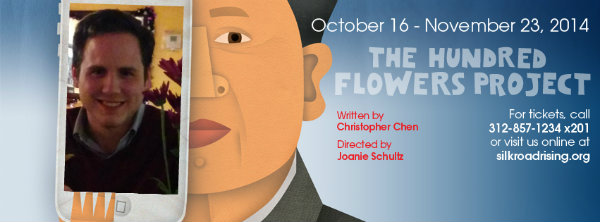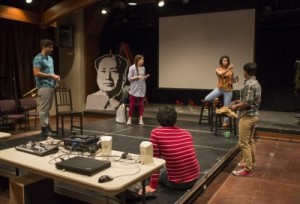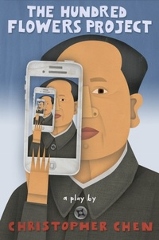
 Recommended ***In my first year history class, the professor explained the Cultural Revolution in China in the following way, “The Communist dictator general Mao promised academic freedom in China, saying ‘let a hundred flowers bloom, a thousand thoughts of school attend,’ people took him at his word, he found out who the dissenters where, and eliminated them on charges of sedition: General Mao, love him or hate him, you have to give him some Machiavellian Kudos” Although English and history were my major areas of study, that is all I ever learned about the Cultural Revolution, but I never forget it, and I think it is all you need to know about the to know, at least about the Cultural Revolution, to enjoy this play.
Recommended ***In my first year history class, the professor explained the Cultural Revolution in China in the following way, “The Communist dictator general Mao promised academic freedom in China, saying ‘let a hundred flowers bloom, a thousand thoughts of school attend,’ people took him at his word, he found out who the dissenters where, and eliminated them on charges of sedition: General Mao, love him or hate him, you have to give him some Machiavellian Kudos” Although English and history were my major areas of study, that is all I ever learned about the Cultural Revolution, but I never forget it, and I think it is all you need to know about the to know, at least about the Cultural Revolution, to enjoy this play.
The Hundred Flowers Project” is meta-theatre (a play about itself)—a definite theme this season for Chicago’s storefront theatres. In the first act, a tyrannical but dynamic artistic director, named Mel (Mia Park), tries to write and produce a play about the Cultural Revolution in China. She encourages the members of her cast to contribute their ideas during discussions in real-time, and catalogue them electronically on a shared document database, but it becomes clear that she is interested in possessing sole control and influence over the play, and she suppresses dissent. For this act, the technical aspects of this play: lighting (Sarah k. Hughey), special effects (Michael Stanfill and Peter J. Storms), setting (Chelsea M. Warren), and costumes (Izumi Inaba) are all played-down. After all, how hard is it to make a theatre company look, sound, and feel like a theatre company, but it the second Act, they are played up even if they were extremely basic and conventional. That said, theaters so often underuse these assets that it was nice to see them emphasized, and even their stock-nature helped highlight the abrupt shift from a pretty basic meta-theatrical piece in the first act to an extremely complicated theoretical narrative in the second.
We don’t actually see most of the play Mel has composed in the second act, but it’s been a huge success with a world tour: except, it hasn’t. Postmodern critiques of narrative history, and I guess of narrative theatre, have meant that the history of the play has been distorted, and we hear terrible stories about dissent and failure by the cast, and even audience, brutally crushed by Mel, and a human “sacrifice.” (There is some highly symbolic and stylized but affecting violence, reminiscent of video footage of any number of totalitarian states, both in the play-within-a-play that the theatre ensemble is putting on and in the actual play which we are watching.) To make matters worse, post-modern critiques of historical and literary narratives (sometimes called “historical-meta-fiction when combined) have moved beyond history and the stage, to the company member’s very lives. Their memories have been destroyed and life histories altered, and much of this has happened because of the social media with which we write and edit or own personal histories, but perhaps the truth exists and can be discovered.
The connection of our experience of social media to the Cultural Revolution is never clearly, or articulately made, despite being, I believe, one of the play’s central arguments. That the plays arguments do remain so obscure is a real problem in a play that is often heavy-handed: it doesn’t take a genius to get from Mel to Mao. It’s to everybody’s credit: playwright Christopher Chen, director Joanie Schultz, the actors, and the techs, that this story comes off as highly credible, despite the fact that it is sci-fi and surreal while not appearing to be set in the future. One can appreciate the dialogue, humor, acting, and highly stylized blocking which are all very good, without buying into, or even understanding, the play’s central arguments. (Or else I couldn’t recommended it) In particular, the blocking of the second act, in which the characters stand, move, and interact with each other in beautifully stylized and graceful ways, helps the audience feel the tension and violence of the piece even when the narrative and dialogue become too confusing. Mia Park gives a wonderful performance as Mel: alternatively deranged, brutal, competent and charismatic, and the lovely Melissa Canciller plays Julie and the Journalist with perfect believability and evokes an empathy for her character with a talent that is as rare as her technique is mysterious and invisible .
I am very grateful that Silk Road Rising is giving such talented actors and actresses of non-western ethnicities opportunities to act without having to take the enormous risk that is color-blind casting. Ultimately, although this play expects people to bring way too much knowledge about the Cultural Revolution, post-modern critiques of history, historical meta-fiction, discourses surrounding digital media, and probably five or six other things of which I am totally ignorant, to the performance, it succeeds at what theatre is at its very core: writing, acting, directing, and technical work, and perhaps that is a pretty neat, if accidental, tension in a play entrenched in twenty theoretical discourses.
Yhe Hundred Flowers Project is being produced by The Silk Road Rising Theatre Company at their home located in the Loop at Pierce Hall in the Historic , Chicago Temple Building at 77 West Washington Street ( at Clark) in the lower level. It will run through November 23rd with performances
Thursdays at 7:30 p.m.
Fridays and Saturdays at 8 p.m.
Sundays at 4 p.m.
Tickets are $35 ( students $17.50) and there is discount parking down the street at 230 West Washington ( get the voucher at the box office). To order tickets call Silk Road at 312-857-1234 ext 201 or visit theirsite, www.silkroadrising.org
To see what others are saying, visit www.theatreinchicago.com, go to Review Round-up and click at “The Hundred Flowers Project”






More Stories
“Joseph and the Amazing Technicolor Dreamcoat”
“The Book Of Mormon” ( Milwaukee) reviewed by Amy Menzel
“The Joffrey Ballet’s Golden Hour” reviewed by Carol Moore